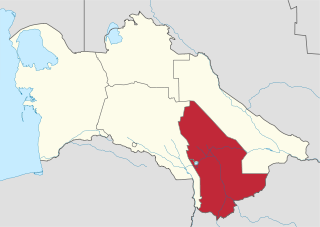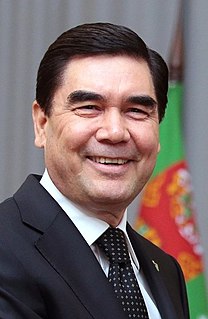
Ashgabat, formerly named Poltoratsk between 1919 and 1927, is the capital and the largest city of Turkmenistan. It is situated between the Karakum Desert and the Kopet Dag mountain range in Central Asia. It is also near the Iran-Turkmenistan border.

Turkmenistan, also known as Turkmenia, is a landlocked country in Central Asia, bordered by Kazakhstan to the northwest, Uzbekistan to the north, east and northeast, Afghanistan to the southeast, Iran to the south and southwest and the Caspian Sea to the west. Ashgabat is the capital and largest city of the country. The population of the country is about 6 million, the lowest of the Central Asian republics. Turkmenistan is one of the most sparsely populated nations in Asia. Citizens of Turkmenistan are known as Turkmenistanis, Turkmenians or Turkmens.

Mary Region is one of five provinces in Turkmenistan. It is located in the south-east of the country, bordering Afghanistan. Its capital is the city of Mary. Its area is 87,150 km2 (33,650 sq mi) and population 1,480,400. The average population density is about 15 persons per square kilometer, but it reaches 150–200 per square kilometer in the most developed oases.

Mary, formerly named Merv, Meru and Alexandria Margiana, is a city on an oasis in the Karakum Desert in Turkmenistan, located on the Murgab River. It is the capital city of Mary Region. In 2010, Mary had a population of 126,000, up from 92,000 in the 1989 census. The ruins of the ancient city of Merv are located near the city.
The Turkmenistan national football team represents Turkmenistan in men's international football and it is controlled by the Football Federation of Turkmenistan, the governing body for football in Turkmenistan. Turkmenistan's home stadiums are the Ashgabat Olympic Stadium and the Kopetdag Stadium. The team represents FIFA and Asian Football Confederation (AFC).

Admiral Sir Astley Cooper Key, was a Royal Navy officer. As a junior officer he saw action at the Battle of Vuelta de Obligado in November 1845 during the Anglo-French blockade of the Río de la Plata and took part at the Battle of Bomarsund in August 1854 and the Bombardment of Sveaborg in August 1855 during the Crimean War. He also went ashore with the naval brigade to take part in the Battle of Canton in December 1857 during the Second Opium War. He later commanded a specially-formed Baltic Fleet created in February 1878 to intimidate Russia from entering Constantinople during the closing stages of the Russo-Turkish War. He became First Naval Lord in August 1879 in which role he was primarily interested in administration and technology rather than strategy: he kept the cost of running the Navy within budgets, sanctioned the construction of six Admiral class battleships and ensured the Navy was properly prepared for the Panjdeh Incident in 1885 when Russian forces seized Afghan territory at Panjdeh.

The Panjdeh incident was an armed engagement between the Emirate of Afghanistan and the Russian Empire in 1885 that led to a diplomatic crisis between the British Empire and the Russian Empire caused by the Russian expansion south-eastwards towards the Emirate of Afghanistan and the British Raj (India). After nearly completing the Russian conquest of Central Asia the Russians captured an Afghan border fort, threatening British interests in the area. Seeing a threat to India, Britain prepared for war but both sides backed down and the matter was settled by diplomacy. The effect of this incident was to stop further Russian expansion in Asia, except for the Pamir Mountains and to define the north-western border of Afghanistan.
War in Afghanistan, Afghan war, or Afghan civil war may refer to:

Serhetabat is a city and administrative center of Serhetabat District, Mary Province, Turkmenistan, in the valley of the Kushka River. The population was 5,200 in 1991. It is immediately opposite Torghundi, Afghanistan, with which it is connected by a road and a 1,520 mm gauge railway.

The Transcaspian Oblast, or just simply Transcaspia, was the section of Russian Empire and early Soviet Russia to the east of the Caspian Sea during the second half of the 19th century until 1924.

Gurbanguly Mälikgulyýewiç Berdimuhamedow is a Turkmen politician who has been serving as the president of Turkmenistan since February 2007.
The following is a list of official matches played by Turkmenistan national football team throughout its history.

The list of Turkmenistan-related articles is below

The Battle of Geok Tepe in 1881 was the main event in the 1880/81 Russian campaign to conquer the Teke Turkomans. Its effect was to give the Russian Empire control over most of what is now Turkmenistan, thereby nearly completing the Russian conquest of Central Asia.

The Saryk are a tribe of Turkmens in Turkmenistan. The Saryk mostly live in the valley of the Marghab River.

Iranian Turkmens are a branch of Turkmen people living mainly in northern and northeastern regions of Iran. Their region is called Turkmen Sahra and includes substantial parts of Golestan Province of Iran.
The Afghan Boundary Commission was a joint effort by the United Kingdom and the Russian Empire to determine the northern border of Afghanistan The Boundary Commission traveled and documented the northern border area during 1884, 1885, and 1886.

The Afghanistan–Turkmenistan border is 804 km (500 mi) in length and runs from the tripoint with Iran to the tripoint with Uzbekistan.

The Afghanistan–Uzbekistan border is 144 km (89 mi) in length and runs from the tripoint with Turkmenistan to the tripoint with Tajikistan along the Amu Darya river. It is by far the shortest of Uzbekistan's external borders.
There are no confirmed cases of COVID-19 in Turkmenistan with the totalitarian government being proactive in censoring relevant information. It is however expected to have spread in the country unreported; specifics are difficult to ascertain and confirm in absence of independent media.














